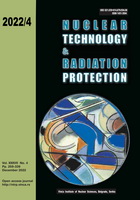
EVALUATION OF THE RADIATION EFFECT ON BUILDING HIGHWAY SUBGRADE USING 137Cs SLIGHTLY POLLUTED SOIL AFTER NUCLEAR POWER PLANT ACCIDENTS

Vol.
XXXVII, No. 4, Pp. 259-339
December 2022
UDC 621.039+614.876:504.06
ISSN 1451-3994
Pages: 328-333
Authors: Hailong Chen, Feifei Wu, Yunfeng Shi, Jing Kang, and Bing LianAbstract
After the accident at the Fukushima nuclear power plant in Japan, a large amount of radioactive contaminated soil was generated, which brought great challenges for treating and disposing of the soil. The recycling of slightly polluted soil can reduce the amount of contaminated soil. This paper analyzes the main exposed scenes of 137Cs polluted soil used in the construction of highway subgrade, soil bag handling and paving. The Monte Carlo algorithm (MCNP) and RESRAD-ONSITE program are used to simulate the two scenes respectively, and the concentration of 137Cs is derived in the soil at the effective dose of 1 mSv per year. It is concluded that: the annual effective doses of porter and paver are 0.41 mSv per year and 0.23 mSv per year respectively caused by 1 Bqg-1 137Cs contaminated soil; the activity of 137Cs are 2.44 Bqg-1 and 4.26 Bqg-1 respectively in the soil at 1 mSv per year for porter and paver; the calculated results are consistent with those reported by the Japan Atomic Research Agency. Also, they are lower than the activity concentration corresponding to the effective dose control level of 1 mSv per year under low-probability events in IAEA No. RS-G-1.7 slightly.
Key words: recycling, 137Cs, soil
FULL PAPER IN PDF FORMAT (478 KB)